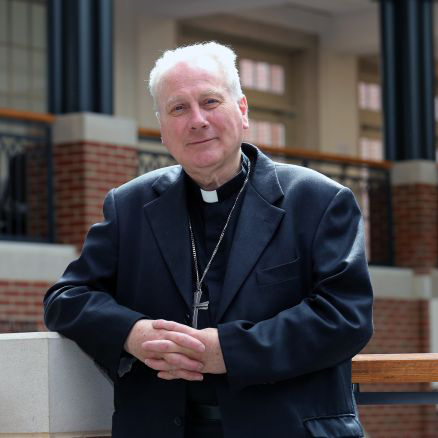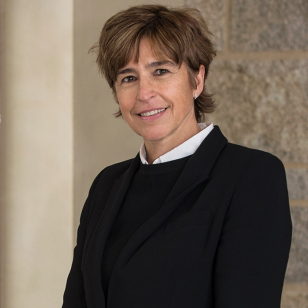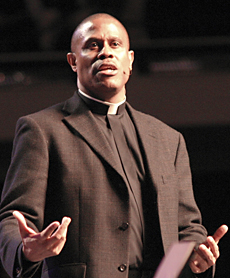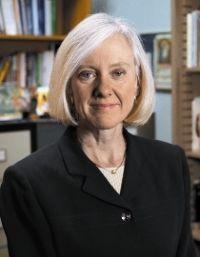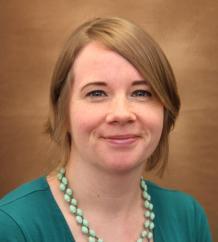In 1994, through the generosity of the Bannan Institute of the Ignatian Center for Jesuit Education and the Department of Religious Studies, Santa Clara University inaugurated the Santa Clara Lectures.
This series brings to campus leading scholars in theology, offering the University community and the general public an ongoing exposure to debate on the most significant issues of our times. Santa Clara University publishes these lectures and distributes them throughout the United States and internationally.
-
The Pope, the Poor, and the Planet: Overcoming Insularity in an Integral Ecology
Fr. Jose Ramon "Jett" Villarin, S.J., 6 April 2016
Given the ecological risks that face us and the uneven distribution of responsibilities, how can we overcome a sense of fragmentation and insularity? Reflecting on how Pope Francis’ call for an integral ecology resonates with those of us who live in more vulnerable parts of the world, we can discern pathways of hope, inspiring us all to care for our common home.
-
Grace in Shakespeare
Marilynne Robinson, 26 Feb 2014
Marilynne Robinson, author Gilead, which won the 2005 Pulitzer Prize for fiction and the 2004 National Book Critics Circle Award for Fiction, shares on the depth of experience present in Shakespeare's work that sheds light on Grace.
-
To Recognize and Develop the Spiritual Bonds that Unite Us
A Reflection on Christian-Muslim Relations Since Vatican II
Archbishop Michael L. Fitzgerald, 25 Apr 2013
This Santa Clara Lecture wishes to assess the progress of this dialogue since Vatican II in four areas: harmonious living, cooperation in the service of others, theoretical foundations, and sharing of religious experience.
-
Multiple Religious Belonging and Christian Identity
Catherine Cornille, 15 Feb 2012
In this lecture, we discuss the different types of multiple religious belonging, while also attempting to understand the logic of single and exclusive religious belonging which remains the ideal for most religious traditions.
-
Cross-Racial Solidarity
Insights from and Challenges to Catholic Social Thought
Bryan N. Massingale, 11 Nov 2010
In the 2010-2011 Santa Clara Lecture, Professor Bryan Massingale will seek to address these questions and reflect on the the kind of virtues and spirituality needed for cross-racial solidarity today.
-
Evangelization and Inter-religious Dialogue
Compatible Parts of Christian Mission?
Peter C. Phan, 23 Feb 2010
The lecture addressed the theme of Christian mission (evangelization as part of Christian calling) in the context of religious pluralism.
-
Prophetic Discourse in the Public Square
M. Cathleen Kaveny, 11 Nov 2008
This lecture will examine the ethics of using prophetic discourse with respect to morally and politically controversial issues in a pluralistic society.
-
Diversity as Tradition: Why the Future of Christianity is Looking more Like its Past
Dr. Gary Macy, 08 Nov 2007
Macy argues it is time to recover diversity as the real tradition of Christianity, a diversity open once again to accepting the best of each Christian community as well as the best of the traditions with which Christians interact.
-
Newman and the Restoration of the Interpersonal in Higher Education
Michael J. Buckley, 14 Nov 2006
Buckley delves into the meaning of the difference between Newman's vision for the modern university and the reality of today's institutions.
-
Church Leadership, Ethics and the Future
James Keenan, S.J., 7 Mar 2006
Most Roman Catholic clergy and bishops receive little if any professional ethical training. While they are taught how to govern and make ethically accountable the members of their congregations, they are not taught by what reasoning, insights, or norms, they should govern themselves ethically.
-
Why is Christianity, the Religion of the Colonizer, Growing so Fast in Africa?
Lamin Sanneh, 11 May 2005
Professor Sanneh will speak to us on the topic of: "Why is Christianity, the Religion of the Colonizer, growing so fast in Africa and what can Euro-American Christians learn from these Christianities?"
-
You Bet Your Life: Finding Meaning, Purpose, and Perhaps, Vocation
James W. Fowler, 27 Apr 2003
Fowler explores various approaches to shaping a sense of life's meaning and for shaping a guiding purpose for one's life.
-
On Being a Catholic Feminist
Lisa Sowle Cahill, 27 April 2003
U.S. Catholic women growing up at the time of the Second Vatican Council have a different experience of Catholicism and society than that of young adults today. While Vatican II women have strong roots in a cohesive Church, they also came of age in a more repressive society and in a religious community with separate, hierarchical gender roles. While these two groups of women have different experiences of sexuality, gender, and the home-work conflict, they can share a feminism based on Catholicism’s strong traditional commitment to social justice and to a sacramental understanding of faith, reappropriated for a newly global and participatory Church.
-
Gendered Theologies and the Common Good: Discerning Spiritual Care Pathways with Transgender and Intersex People
Susannah Cornwall, October 12, 2017
Intersex and transgender have received increasing attention in the media and public discourse over the last decade, but are still under-examined theologically. This lecture highlights some implications of variant sex and gender for Christian theology and pastoral care, and explores the challenges and benefits of ensuring appropriate spiritual care for transgender and intersex people.



